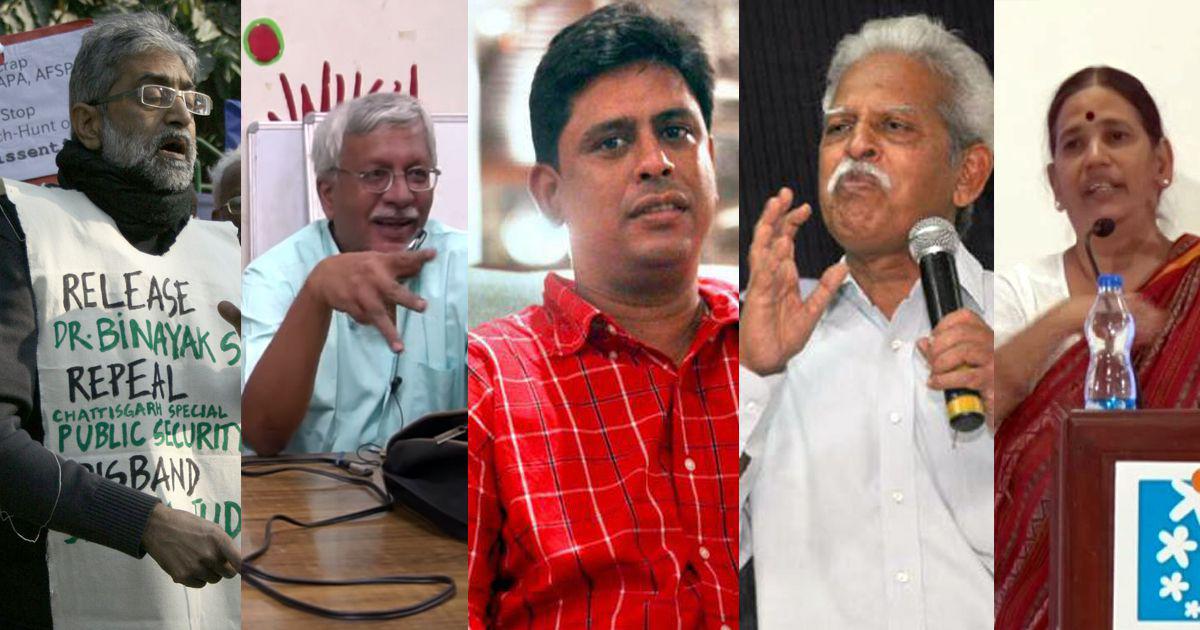In a setback to the Pune police, the Bombay High Court on Wednesday quashed a special court’s order granting an extension of 90 days to the police to file a charge-sheet against five persons with alleged Maoist links who were arrested in June this year in connection with the January 1, 2018 Bhima-Koregaon riots.
However, upon a plea by the Prosecution that it wanted to test legality of the the high court’s order in the Supreme Court, a single-judge HC bench of Justice Mridula Bhatkar stayed till November 1 2018 the implementation of her order quashing the Pune special court’s order to facilitate the Maharashtra Government to challenge the HC order in the apex court.
While quashing the Pune Special court’s order, the high court took cognisance of the fact that there was no compliance of section 43-D of the of the Unlawful Activities (Prevention) Act, 1967 which mandates the Public Prosecutor to submit a report justifying the extension of time for filing the charge-sheet in the case.
“This shows that the Investigating Officer has navigated the application for extension of period by further 90 days, which is not contemplated under the proviso to section 43-D of the Act. It is to be remembered that the Investigating Officer is always interested in the success or the conviction in the case. However, it is the duty of the Public Prosecutor to assist the Court in the process of administration of justice by upholding the law,” Justice Bhatkar noted.
Quoting the judgment in the case Hitendra Vishnu Thakur vs. State of Maharashtra (supra) case, the judge noted: “….The request of an investigating officer for extension of time is no substitute for the report of the public prosecutor. ….”
On September 2, a Special Unlawful Activities (Prevention) Act (UAPA) court had granted an extension of 90 days to the police to file a charge-sheet against five persons with alleged Maoist links who were arrested in June this year in connection with the Elgaar Parishad held in Pune and the subsequent January 1, 2018 Bhima-Koregaon caste riots.
Five Maoist-linked activists Human Rights activists Rona Wilson Jacob, Surendra Gadling, Sudhir Dhawale, Prof Shoma Sen and Mahesh Raut were arrested by the Pune police on June 6, in connection with the Elgaar Parishad and subsequent Bhima-Koregaon caste riots.
Subsequently on June 8, the investigators had claimed that they had recovered from the tap top of Wilson an allegedly incriminating letter, which uncovered an alleged plot by the Maoists to carry out “Rajiv Gandhi-type” assassination of Prime Minister Narendra Modi.
On August 28, the Pune police arrested five more activists Varavara Rao, Vernon Gonsalves and Arun Pereira, Sudha Bharadwaj and Gautam Navlakha for their association with the Elgaar Parishad held in Pune ahead of the January 1, 2018 Bhima-Koregaon riots and their alleged links with the Maoists. However, the Supreme Court ordered that the five arrested activists be placed under house arrest till September 6.
“The period of their judicial custody of 90 days is coming to an end on September 3. With the fresh five arrests in the case, the investigation of the crime is in the progress and sought extension of 90 days for filing charge sheet,” Pune’s Assistant Commissioner of Police (ACP) Shivaji Pawar had told the court.
“Under the Unlawful Activities (Prevention) Act, which is invoked in the case, if the investigation is not completed within 90 days, the period can be extended up to 180 days,” ACP Pawar had said.
The section 43-D of the Unlawful Activities (Prevention) Act, 1967 which deals with modified application of certain provisions of the Code, provides for “if it is not possible to complete the investigation within the said period of ninety days, the Court may if it is satisfied with the report of the Public Prosecutor indicating the progress of the investigation and the specific reasons for the detention of the accused beyond the said period of ninety days, extend the said period up to one hundred and eighty days”.
The arrests of ten persons with alleged Maoist links made by the Pune police in two batches — five on June 6 and another five on August 28 — were part of their investigations into the FIR registered on January 8 at the Pune’s Vishram Baug Police Station in connection with the Elgar Parishad organised on December 31, 2017 by the leftist outfit Kabir Kala Manch (KKM) and Republican Panthers Party ahead of the January 1, 2018 Bhima-Koregaon riots. The FIR, originally registered u/s 153(A), 505 (1)(b), 117 and 34 of the Indian Penal Code (IPC), had made out a conspiracy case in March 2018 and relevant sections of the Unlawful Activities Prevention Act (UAPA) were added to the case latter.
Defending the fresh arrests of five activists with alleged Maoist links on August 28, Pune’s Deputy Commissioner of Police (Crime) Shirish Sardeshpande had said on August 29 that the evidence gathered by the investigators had shown that a conspiracy had been hatched by the CPI (Maoist) to form an all India united front “to overthrow the government established by the law” and that the Elgaar Parishad had been organised in Pune on December 31, 2017 to pursue this conspiracy.
Sardeshpande had also referred to the arrests made on June 6 and claim made by the Pune police on June 8 that they had uncovered a plot by the Maoists to carry out “Rajiv Gandhi-type” assassination of Prime Minister Narendra Modi
It may be recalled that on January 1, one Rahul Phatangale (28), a Dalit, was killed and another 40-odd vehicles and some other property were damaged after some miscreants attacked Dalits celebrating the January 1, 1818 victory of British troops over Peshwa Bajirao II’s army at Bhima-Koregaon in Pune district of western Maharashtra. Following the incident, Maharashtra had witnessed large-scale Dalit protests which turned violent at some places.
The telegraph

Leave a Reply